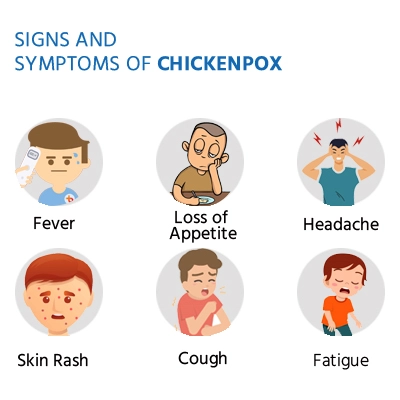Symptoms, Causes, and Treatment of Chicken Pox
The varicella-zoster virus causes varicella, or chickenpox, which is a highly contagious infection. Most people recover in 1-2 weeks, despite the unpleasant symptoms. It's a viral illness that causes a rash that looks like blisters. The rash starts on the face and chest and then spreads across the body. It causes an itchy rash with small, fluid-filled blisters. It is especially contagious in those who have not been immunised. Chickenpox is not a life-threatening illness, although it can cause complications. Chickenpox is the most common infection among babies. Chickenpox can, however, infect adults. It's referred to as a little infection. In severe cases, blisters can extend to the mouth, nose, eyes, and genitals.
Stages of Chicken Pox
There are three stages in which the infection progresses:
- Stage One: Rashes appear in the first stage. They might also be lumps that are pink or red in color. These are known as papules. They appear on your entire body.
- Stage Two: Over the course of the following few days, the bumps will transform into fluid-filled tiny blisters. These are known as vesicles, and they can linger for up to a day before bursting and oozing.
- Final Stage: In the third and final phases, the open wounds will crust up and produce scabs. This infection can be passed to other persons until all of the spots crust over.
Symptoms of Chicken Pox
Symptoms in Adults
If you're an adult who's had chickenpox for the first time, you'll notice the following symptoms:
- Body aches
- Sore throat
- Cough
- Fatigue
- Fever
Symptoms in Babies
The following are some indications of chickenpox in children:
- Changes in feeding habits, as well as a loss of appetite
- As the infant suffers itching or pain, his or her sleeping habits will change
- Excessive crying or a lack of response to pain-relieving efforts
- The rash is preceded by a fever
- Increased sleepiness

Risk Factors of Chickenpox
If you haven't had chickenpox as a child or haven't got the chickenpox vaccination, you're at risk of acquiring it as an adult. Other aspects to consider are:
- Living with children under the age of 12 who have not been vaccinated
- Working at a school or with children
- Staying in a room with an infected individual for more than 20 minutes
- Touching the rash of someone who has chickenpox or shingles
- Touching clothing or bedding that has recently been used by an affected individual
People are at a higher risk of developing complications from the following conditions:
- A woman who is pregnant and has never had chickenpox
- A person who is taking an immune-suppressing medicine, such as chemotherapy
- Someone whose immune system has been weakened by another illness, such as HIV
- Someone who is taking steroid medicines for another reason, such as rheumatoid arthritis
- An individual whose immune system has been damaged by a previous organ or bone marrow transplant
Complications
Chickenpox complications can arise, although they are uncommon in healthy persons who contract the disease. Chickenpox can cause serious problems.
- A woman who is pregnant and has never had chickenpox
- A person who is taking an immune-suppressing medicine, such as chemotherapy
- Someone whose immune system has been weakened by another illness, such as HIV
- Someone who is taking steroid medicines for another reason, such as rheumatoid arthritis
- An individual whose immune system has been damaged by a previous organ or bone marrow transplant
Diagnosis of Chickenpox
The characteristic rash is generally enough for doctors to diagnose chickenpox. The doctor can advise you on how to avoid issues and which medications to use to relieve itching. If one develops rashes on the body that are accompanied by a cold and fever, one should see a doctor immediately. The doctor will use a physical examination of the rashes and blisters to assess whether one has caught the virus. The doctor may also order blood tests or a lesion sample test for additional confirmation.
Treatment for Chickenpox
Chickenpox doesn't always require medical attention in healthy children or adults. The doctor, on the other hand, will advise patients to do the following:
- Prescribe an antihistamine to help with itching relief
- The disease is allowed to develop according to the stages
- Avoid scratching the itch since this can create markings on your skin and lead to additional skin illnesses
- Wear loose, cotton clothing at home to allow the skin to breathe
- Alternatively, patients might take lukewarm baths and use unscented lotion. Calamine lotion can also suffice
- One may also bathe in oats and pat the skin dry afterwards
- Always avoid touching the skin
- Make sure you're not overheating. Choose a cool, shady spot to remain to avoid the heat
